AMD Radeon HD 7950 Review Feat. Sapphire & XFX: Sewing Up The High-End Market
by Ryan Smith on January 31, 2012 9:02 AM ESTOverclocking: Power, Temp, & Noise
In their marketing materials AMD is heavily pushing overclocking, and they have good reason to. With the 7970 we’ve established that Tahiti has quite a bit of overclocking headroom, and as the 7950 is clocked lower by default this opens up that headroom even further. Realistically AMD’s binning process means that the best clocking Tahiti GPUs are going to be allocated to the 7970 unless they have failed shaders, but even with that there’s quite a bit of potential on paper.
As with overclocking the 7970, our goal overclocking the 7950 is to see how much you can get for free; that is without any voltage adjustments. AMD’s reference PCBs are not particularly overbuilt for overclocking—cards like that will come later—so sticking to the reference voltage is the safest option, not to mention the easiest. With the 7970 we were able to get 200MHz (22%) overclocks without any voltage adjustment, and we’re hoping for the same out of the 7950.
With that said, we quickly ran into a wall on one card: the Sapphire 7950. Sapphire’s low VID of 0.993v may be great for temperature and noise at stock, but it’s not doing overclocking any favors. We only hit 950MHz at that voltage. As the Sapphire was the odd man out—every other card was at 1.093v—we did end up overvolting the Sapphire to 1.093v to see what it was capable of when put on similar footing as the rest of our cards.
After bringing up the voltage of our Sapphire card, all of our 7950s ended up overclocking to very similar levels. Our Sapphire and AMD cards topped out at 1025MHz core, a 225MHz (28%) overclock over a stock 7950 and a 125MHz (14%) overclock over the Sapphire’s factory overclock, while our XFX card reached 1050MHz, a 150MHz (17%) overclock beyond XFX’s factory overclock. Meanwhile the memory clocks on all of our cards topped out at 5.8GHz, beyond which we’d start seeing performance regressions from error correction on the memory bus.
| Radeon HD 7950 Overclocking | |||||
| AMD Radeon HD 7950 | Sapphire HD 7950 Overclock Edition | XFX R7950 BEDD | |||
| Shipping Core Clock | 800MHz | 900MHz | 900MHz | ||
| Shipping Memory Clock | 5GHz | 5GHz | 5.5GHz | ||
| Shipping Voltage | 1.093v | 0.993v | 1.093v | ||
| Overclock Core Clock | 1025MHz | 1025MHz | 1050MHz | ||
| Overclock Memory Clock | 5.8GHz | 5.8GHz | 5.8GHz | ||
| Overclock Voltage | 1.093v | 1.093v | 1.093v | ||
As you can imagine, with such similar overclocks, gaming performance on all 4 cards ended up being very similar. So we’ll get to gaming performance in a minute, while we’ll start with power, temperature, & noise.
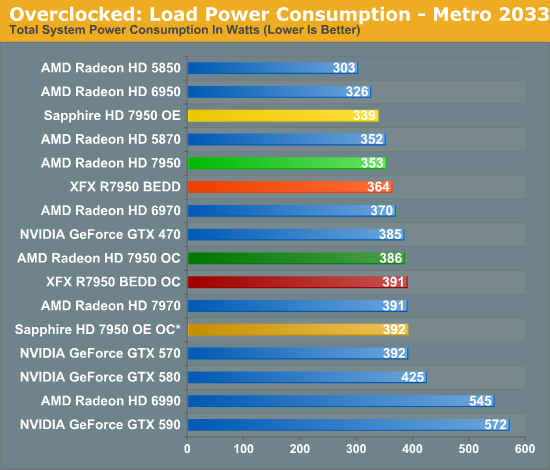
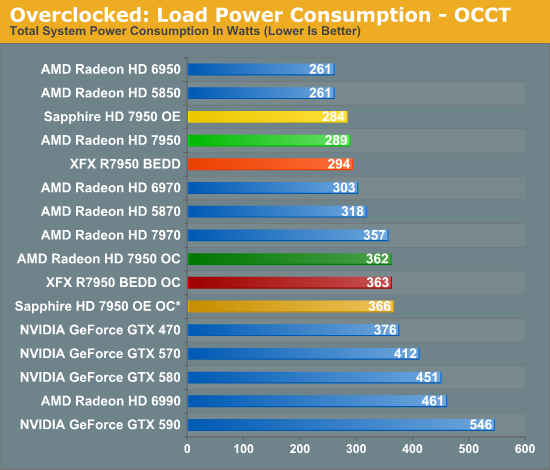
Even though we’re not increasing the voltage on our AMD and XFX cards, merely overclocking them and raising the PowerTune limit to avoid throttling does drive the power consumption up. As is typical with heavily overclocked cards, overclocking quickly drives up power consumption and the 7950s are no exception. After overclocking power consumption is almost identical to the stock 7970, so while you can get 7970 performance you still need to pay the price with 7970 power consumption. Meanwhile it’s interesting to note that even with the extra 0.1v we’ve given the Sapphire card its final power consumption is only ever so slightly higher than the other 7950s, proving that voltage is the great equalizer in this case.
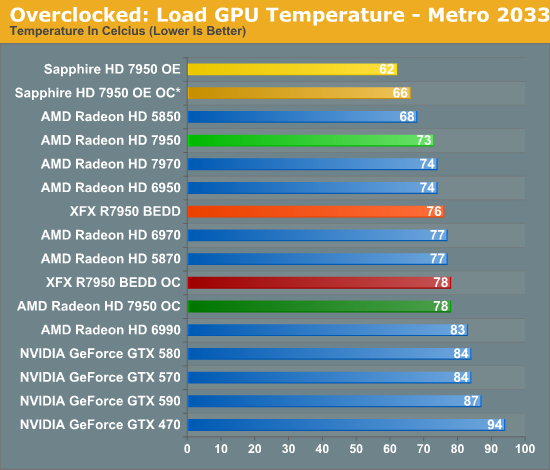
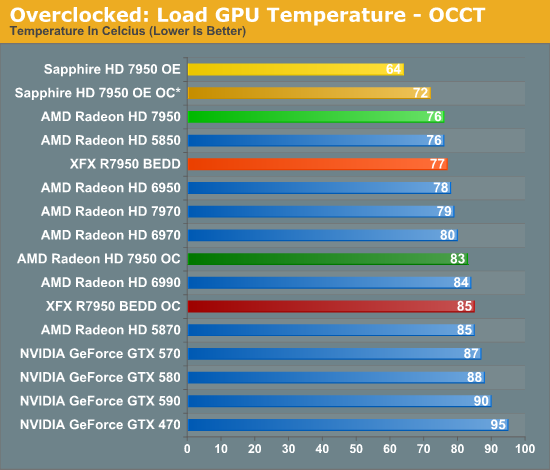
With the increase in power comes an increase in temperatures. The Sapphire card still does very well here staying in the low 70s even under OCCT, while the reference and XFX cards hit the high 70s under Metro and mid 80s under OCCT. As we’ve yet to really ascertain what the thermal limits are for Tahiti, it’s not clear whether there’s too much thermal headroom left for the GPU, particularly under OCCT.
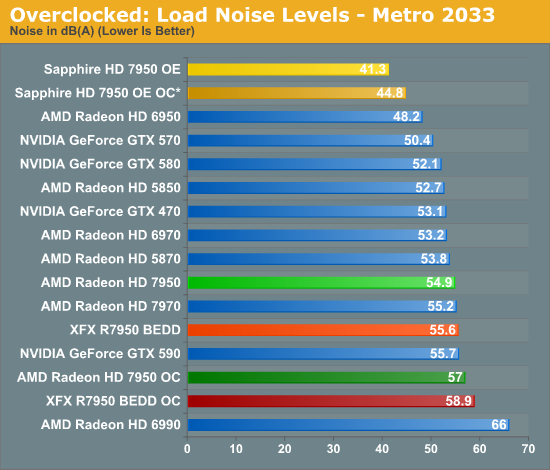
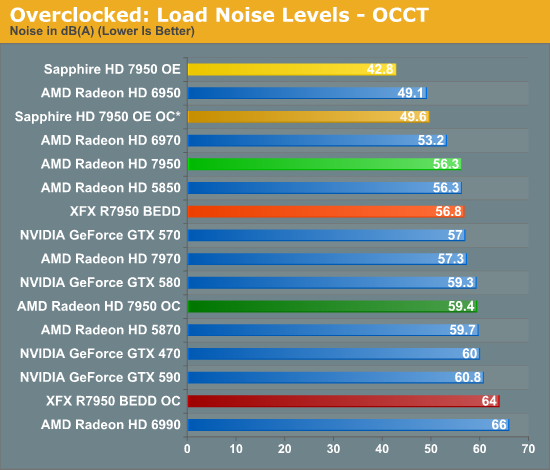
Last but not least we have load noise. The Sapphire card is once more a stellar performer, and we still can’t get it above 50dB even with OCCT. Unfortunately the XFX 7950 BEDD has its biggest fallout yet—it may be able to overclock well, but at 64dB under OCCT the performance isn’t going to be worth the immense amount of noise it creates to move enough air to keep the GPU cool.










259 Comments
View All Comments
chizow - Thursday, February 2, 2012 - link
Nonsense, we already covered this. GTX 280 was almost 2x faster than the 8800GTX and about the same performance as the 9800GX2. A true flagship card.ATI exceeded everyone's expectations with the RV770 but grossly underpriced their card, which is the only reason Nvidia was forced to drop their price.
The difference this time around, is that the 7970 does NOT deserve the premium pricing relative to last-gen. The only way AMD will get off the hook is if Nvidia makes the same mistake and prices based on last-gen performance as well and prices their flagship at like $750 lol. It may happen, but I doubt it.
chizow - Thursday, February 2, 2012 - link
Rofl, except I have mountains of historical evidence that back my points, while your nonsensical pricing schemes would have us deciding between new cars or new GPUs.Also back to that running a business part. Its obvious you have no clue what it takes to run a business.
AMD is basically stealing from Peter to pay Paul, they're trading short-term gains for long-term profit by risking the relationship of their most loyal customers. In this business as in any other, customer satisfaction and brand loyalty is paramount.
Unlike their fanboys, it would be criminally negligent of AMD not to consider the pricing of upcoming products from their main competitor: Nvidia. To that end, 28nm parts from Nvidia are imminent, ignoring this fact is just bad business.
We'll see how this shakes out, but honestly I can't see AMD getting off unscathed here unless Nvidia prices Kepler outrageously.
Galidou - Sunday, February 5, 2012 - link
LOL he's fun, while Nvidia made the worse pricing decision in the world like 9800gx2 priced 150$ less than a GTX 280 that performed LESS is so much funny, last gen part vs new gen part comparison here you come....chizow - Sunday, February 5, 2012 - link
What's fun is you can get 2x last-gen parts for cheaper than 1x next-gen parts anytime you want it.Would you buy 2xGTX 460 today instead of a GTX 580 or 7970? Most people would say no, but for those who want it, 2xold is cheaper and faster than 1xnew.
Galidou - Sunday, February 5, 2012 - link
Well if you can do it anytime, what's new with 7970? Ahh it should of driven the prices down, unlike Nvidia's coming up with new gpus to drive the price up. Nvidia up the prices and ATI makes them go down here's your history of things... well things can change, we don'T live in a stable world.Galidou - Sunday, February 5, 2012 - link
Lotsa people already answering to you saying that you make no sense. My philosophy teacher once tole me: If someone come up to you and tells you: ''Hey you are a horse'' you can doubt, a second one comes to you and says the same thing, well you gotta start thinking a little bit, and if a third one comes and tells you the same thing, you should start thinking about buying a saddle.chizow - Thursday, February 2, 2012 - link
And to base buying decisions without acknowledging the 800lb gorilla in the room (Kepler) while simultaneously ignoring the 6 ton elephant in the room (history) would be a monumental mistake.Congrats at successfully trying to manage both!
chizow - Thursday, February 2, 2012 - link
LMAO.See here's the exact flaw in your argument.
AMD doesn't know what Nvidia's performance will be with Kepler.
But they've priced their new product with the assumption Kepler offers no gain, no increase in performance over Fermi.
That's the only possible way they could justify basing their new next-gen, next-process part using old part prices.
This is a massive error in calculation, because unless you're completely oblivious it should be clearly obvious Kepler could beat Tahiti if it were nothing more than a die-shrink of Fermi with higher clocks. 15-25% is NOTHING when looking at a new process node and new architecture, its more of what you would expect from a refresh.
But its OK, despite your claims you have no idea how this industry works, if you did you'd immediately acknowledge the prices AMD is asking for simply aren't justified with all things considered.
chizow - Thursday, February 2, 2012 - link
Because that is what people who are interested in these parts base their buying decisions on. There's not enough incentive otherwise, its not like GPUs expire every 2 years.chizow - Thursday, February 2, 2012 - link
There wouldn't be a problem if the 7950 launched 14 months ago, today its might as well be an exhibit at Jurassic Park.And the 580 for $500? Anyone who has a 580 has put a lot of mileage on those treads and gotten their money's worth. It'll get retired soon enough though, right next to that 7950.